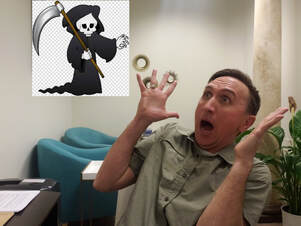 Benjamin Franklin coined the phrase, “there are only 2 things certain in this life; Death and taxes.” And with that, should we talk about ‘death’ or ‘taxes’…let’s go with death – it’s way more fun. Death is a topic that is brought up in session a LOT. And why wouldn’t it be?! No one gets to the next adventure without passing on. In fact, I never even HEAR from people after they die – I do, however, hear from those left behind. Dealing with death can be a struggle so we best work this out because if you haven’t experienced it yet; you will. How do you work through grief? Let's start by examining why we get sad when a loved one dies. From what I hear, the answer generally sounds something like, “I miss them” or “life would be better with them still around” or “it’s unfair that they are gone.” Death is no respecter of persons and the most tragic occurrence typically stem from infant or child deaths. When this happens, people will be sad “for the kids” because they didn't get to "live" or "experience life", etc. Listen, I get grief and am not trying to minimize anyone's loss. Be sad! Grieve! I love it when clients cry because that’s when the healing begins. Negative energy is released through crying those ugly cries. To be quite honest, it’s beautiful and my office is stock full of tissues for this very purpose ~ my issue comes from when the mourning isn’t allowed to move into healing. This "stuck feeling" happens often in our culture. In fact, to provide an answer for it, some professionals will say there is no time limit to grief…what a crappy message. It may as well be a politician answer. So, it’s ok to NEVER heal or stop feeling sad for the death of a loved one?! In my mind, that awful answer is a ‘middle of the road’ and ‘safe’ answer by someone who doesn’t want to hurt someone’s feelings and frankly, doesn't understand how actual healing occurs. As you can probably tell, I am inclined to disagree with the above belief system and for good reason; through years of grief counseling individually and in groups, I've discovered that it’s just not true. Here’s what I've seen and this may surprise you. Everyone can heal from the loss of a loved one and the real shocker; Time is mostly irrelevant when it comes to the healing process. Yea, go ahead and read that again but be sure to read on - it makes sense, I promise. Working with people healing from recent death is JUST LIKE working with people that have been struggling for decades; The stuck feeling stems from their beliefs around death and often what it means to honor the deceased! Isn't that marvelous? Even better, processing through sadness can begin right away with one little thought. Gratitude. In every case of healing, it began with gratitude. “Oh Jed, C’mon – how can I be thankful for someone dying!?” Great question and here’s another for you. What might the person ‘gain’ with death? People are typically a little backed-up at this point so I’ll start you off. Ready? Ok, here's a quick perception shift. If you believe in an after-life (or after-energy) it must mean they’ve gone on to the next adventure! Or, you can even think of it as ‘graduating this life’. How cool is that! It's a gratitude maneuver. On the other hand…and in the same hand, if you believe that this life is it and everything ends when the heart stops beating it means that they STILL hit the jackpot because hey, they don’t feel any pain and they never will again. Not too shabby if you ask me. Booyah for them! Let's call it, "The gratitude shuffle." It's good to have awareness into feelings. We think and then we feel and then we behave. If you really stop to think about it, we're not sad about the person dying. We're feeling sad for ourselves. Don't worry, this is normal and you're not a bad person for feeling this way. It’s natural to feel the pain of them being gone – it’s just good to know that you really can’t feel bad for them. They’re cool – you’re not. To work through this emotion let’s pull a gratitude maneuver and remind ourselves of the wonderful memories we had with them while they were still with us. Yes they’re gone, but how lucky are you to have had the time you DID with them? You really hit the jackpot. It’s gratitude that heals, not sorrow. It’s gratitude that heals, not sorrow. Some cultures (emotionally healthier ones) CELEBRATE the life of the deceased. Our Western culture is coming around to that more which is wonderful. Every once in a while, instead of having a funeral, I’ll hear people describe the service as “a celebration of life”. Other cultures take things a step further into healing and believe that the happier they are for the deceased individual, the more they loved them. I wonder what you believe. Do you believe that you’re honoring them more by being sad? Some cultures do that, as well…in fact, they actually hire professional ‘mourners’ to ensure that the dead person gets to heaven. True story. If you’re feeling stuck working through the loss of someone you loved, try this: Think of 3 of your favorite memories with them. It’s ok to smile. It’s ok to laugh! Now, as you’re thinking of this, imagine them sitting right here next to you. Can you imagine that? They’re right there! Now tell me, do they look happy as you’re sitting there imagining some crazy-fun-neat experience you had with them? Are they smiling? It’s likely that they’re pretty stoked to see you smiling with their memory. Maybe you’re honoring them more by celebrating their life than crying over your loss. Isn’t death great?! This is one of my favorite discussions to have with clients. In fact, some of my absolute fondest memories are connected to working in groups or individual clients around this often dreaded topic. It’s gratitude that heals, not sorrow. Now, to figure out how to be thankful for taxes! Thanks for reading and for more fun, check out the website www.meaningtolive.com and until next time… Awareness UP. Jed Thorpe, CMHC
1 Comment
 Let's break down what it means to be a helicopter parent along with why it happens aaaand the consequences involved. Don't worry, peeps- after it's said and done, we'll talk about how to repair things as well. Buckle up. This may sting a bit. The term "helicopter parenting" has been around for a while but if you haven't heard of it, you will have witnessed hovering parental effects. Before we get into it, don't you just love the name helicopter parent? It creates a visual in my head of watching the news while they're recording a car chase...from above. The birds-eye view lets us, as viewers, take in SO MUCH information! We can see where the suspect is, where they're going, what they're doing...it really doesn't seem fair because the helicopter view sees EVERYTHING. Doesn't seem fair, does it? Anyone else feel like it's unfortunate for the person being helicopter recorded? Kind of like watching a wounded mouse being toyed with by a cat. Regardless, it's all a great example to explain this new style of parenting. With hovering parents, the child is being 'too closely' monitored. And too much observation often leads to excessive intervention. Helicopter parents keep tabs on all sorts of the kids life. Nothing is safe for the kid to do alone, including school, playmates, what they play, who they play with, how they read, what they read, when they're reading, are they reading too much? Too little? Are they isolating? What are they watching on the television and the list goes on and on...and on. Sounds exhausting, doesn't it? Wait, it gets worse. The hovering parent will OFTEN continue the controlling behaviors after the child grows into adulthood. We're talking parental control/strong influence of where the kid goes to college, what they do for a living and who they end up marrying or living with or 'seeing' if you really want to get non-committal. I've even heard of parents calling up employers asking why their kid didn't get hired for a job. Whoa. You get the point, though - helicopter parents SEE EVERYTHING. Just like the news helicopter. You may be getting the idea that this behavior may not be healthy. Correct. Here's the thing though, parents are doing this with the best of intention! They're not waking up in the morning thinking, "what can I do to take away opportunities to grow for my child?" So, why are they (we, because I'm guilty, too) continuing to behave this way? Well, let's ask this - do you want to help the fragile little mouse that's being toyed with by the mean ole' pussy cat? Of COURSE you do and it's the same thing with helicopter parenting - it's uncomfortable seeing a child struggle. Ends up, hovering parents are merely trying to protect their offspring. Call it a protection reflex...which ends up doing the complete opposite in the long run. Who knew?! "Oh Jed, it's not that bad," you might say. "Oh, it's that bad" will be my reply. Consequences are many with the biggest bummer being correlated to resilience. Kids don't got it. They're...squishy and why wouldn't they be? It makes sense because they've not had the chance to figure out things on their own. They've had a 'buffered' life and when 'actual' life happens (like it always will), their little mouse is unprepared. The child turned adolescent turned adult hasn't built the emotional muscle needed to walk through much, if any, conflict or struggle. Other negative effects include: More health problems Higher levels of anxiety and depression A RELIANCE on medication Labile emotions (can't regulate their feelings) Career burnout And - they're entitled. They confuse privilege with confidence. Does any of this sound familiar? Listen, I'm not trying to bum anyone out, here. Parent's are doing the best they can with the thinking they've got - I get it! Like mentioned already, I am not innocent of this behavior. Now though, we've got more awareness. Now we can start raising our little mouses differently...so they don't end up being played with and punked by life. Instead of our young leaders running away or freaking out with potential struggle, we can teach them to be strong. It's not too late. Here's what we can do: Let them mess up. When you see they're going to very likely fall down - Don't help. JUST WATCH or better yet - turn around and walk away (but not too far). They'll get hurt when they fall down and then they'll get back up. Then, the beautiful part - when they get back up, they'll brush themselves off and look for you - THAT'S when you can be there for them. They can cry and we get to say, "I know you can make it through this" or "you can do this" or "it's ok to feel sad - we all do at times. You are resilient and I believe you'll do the right thing." And in our heads we may even thing, "eventually" while we raise our eyes in exasperation because they've made this mistake before and why are they doing it again!? When this happens, step back - don't pick them up - they'll figure it out. A good saying goes something like, "don't do anything for them that they can do for themselves." The parents responsibility is to prepare the mouse-child for life - unbuffered. Comments are welcome...and am I the only one who's guilty of this?! Thanks for reading. If you're in the mood, check out my YouTube channel and watch the short therapy video on Helicopter Parents. It can all be found at www.meaningtolive.com Until next time, Awareness up! Jed Thorpe, CMHC  Ever messed up? Of course you have – everyone has. Here’s the skinny about feeling guilty about something that’s happened in the past…actually, before we do that, let’s go over a couple of definitions that will help lay the foundation of this concept. Shame and Guilt feels heavy. Often, my clients bring up past mistakes with huge feelings of remorse that they’ve carried for a long time. To begin the process of working through it, we need to know the difference between shame and guilt. Easy stuff here – Shame sounds like, “I am bad” while guilt is “I did something bad”. Told you it was easy. Now lets get to the fun stuff. First off, isn’t it fascinating that humans can carry this heavy feeling for SO LONG? When this topic comes up in session I’ll hear something like, “Jed, it makes sense because I did things that had bad consequences so I need to feel this way.” From there we try to get an idea of how long they need to feel horrible and basically the conclusion ends with the understanding that it basically doesn’t end until they die. Sometimes people carry shame for decades. I would laugh but it is just SO SAD! Thank goodness therapy exists because here’s the deal if this so happens to be you. You are making the judgment and are feeling bad ‘now’ from a completely different perspective than where you were when you did the messed up thing in the first place. It’s an odd concept, I know – it’s also a true concept. Let’s explain it a little more. Here’s how it makes sense. Your awareness and insight has grown from then to now so naturally it’s easier to see what you could have done better. This connects with the whole “hindsight is 20/20” saying. What is so fascinating is that it goes against nature to torture ourselves with these self deprecating statements that we tell ourselves after we mess up. I call this “shoulding on ourselves.” Go ahead and say that 5 times fast. It’s funny and it helps to remember how messy this can get. Fortunately, we can clean this up with a new belief system. Ready? "You did the best you could with the thinking you had." People initially balk at this thought, however it is completely valid. Think about it. Long term angst via shame or guilt makes as much sense as beating yourself up for NOT hitting the mega-millions lucky number power play jackpot. Sure, you gave it the best you had and used all the appropriate lucky numbers or birthdays, etc. but you messed up the winning numbers! So, go ahead and flog yourself for the next long while and while you’re at it, you may as well feel bad for crapping your pants when you were a baby. You did that crap for years! Don’t mind that you were a new human and your body hadn’t developed enough to appropriately discard your stinky excrement. Yes, they are odd analogies and yes, they work. Don’t fight losing this negative emotion. When you look back on life, you’re looking back from a completely different perspective than when you were making there and making the messed up decisions. Allowing this concept into our belief systems will help you understand that it makes no sense to grind our noses into some crap narrative. You were there, it happened, you did your best with the thinking you had and now your thinking is better because your awareness is higher. Whatever happened in your life happened FOR you because it helped shape who you are and who you are is right where you need to be. This is the truth for everything. Life didn’t happen ‘to’ you or ‘to’ your kids or ‘to’ your grandmammy. It happened ‘for’ you and ‘for’ them. Every conflict or struggle has helped you to become stronger. Any other way to perceive ‘bad things’ is a victim-stance and you are definitely not a victim. This was a bit of a philosophical article…that happens sometimes. Thanks for reading and don’t forget to like, comment and share it if you think it’ll help someone. Till next time – awareness up, Jed Thorpe, CMHC www.meaningtolive.com |
Archives
June 2024
|
Proudly powered by Weebly
 RSS Feed
RSS Feed